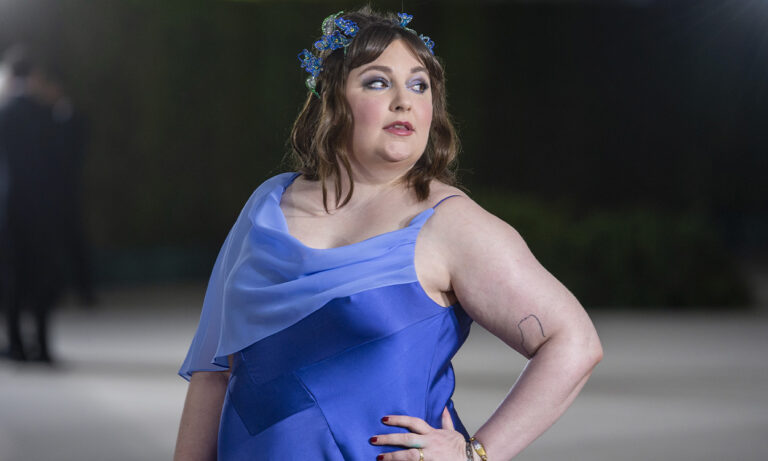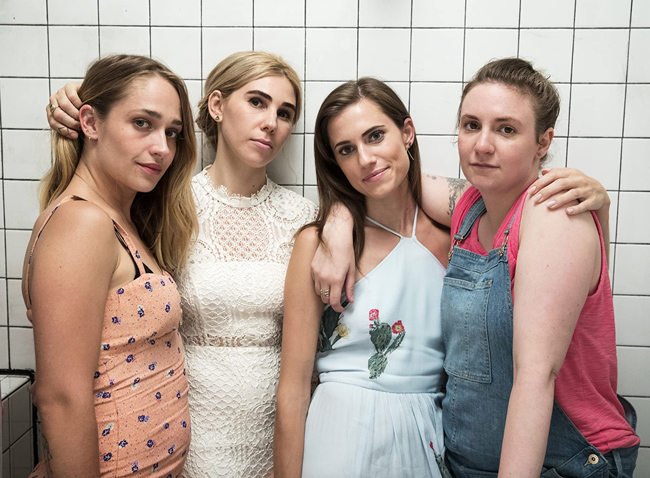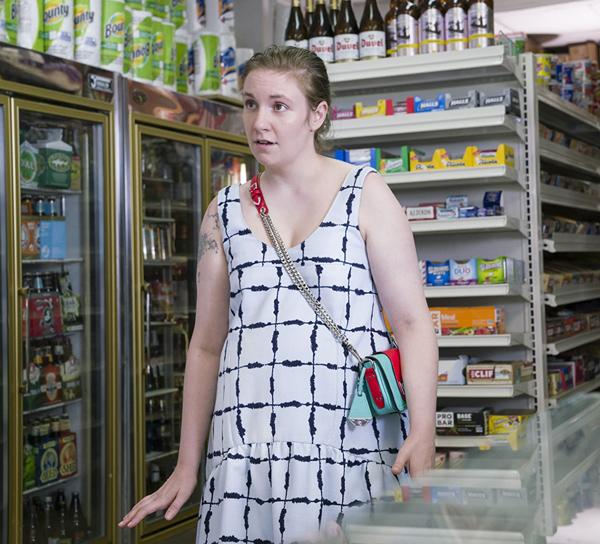Has everyone forgotten about Lena Dunham’s controversial signature brand of problematic feminism?

Like so many other youngsters who grew up in the 2000s, I had a deep affinity with TV shows that romanticised living in New York. I devoured any series I could get my hands on where the protagonists would be dating everyone, drinking martinis, and living the life of a raucous 25-year-old who, despite having no stable income, still managed to lead an exhilarating and fulfilling life. Oh, and if there was an anonymous online tipster who acted as the local gossip and tortured the lives of the Manhattan elite, that was also a plus.
Sex and the City and Gossip Girl aside, being a young girl who treasured female friendship above all else, one of my absolute favourite shows was Girls, a raunchy and objectively funny series which showcased a group of friends navigating city life and dismantling the patriarchy as they went.
Of course, as the years have gone by, my love for the show has morphed more into a feeling of nostalgia and gratefulness for what it taught me, while also acknowledging its serious flaws. And, at the helm of this project which I once held so close, was actress, writer and director Lena Dunham.
Once considered a radical feminist, paving the way for women in the film and TV industry, Dunham’s reputation has since worsened considerably. As the world woke up to the problems surrounding Girls, it also woke up to the serious issues regarding its creator. Let’s unpack some of the most significant controversies connected to Dunham.
The lack of diversity in ‘Girls’ and problematic feminism
When it was first released, Girls was championed for holding up a lens to the female experience—something that had been seriously missing from American TV. However, it only captured one specific experience, that of inherently privileged white women.

There is something to be said about the fact that Dunham’s character Hannah Horvath was in a way highly transformative for the TV industry, due to the fact that she didn’t fit the toxic stereotypical western ideal of beauty.
Of course, that in itself was a highly problematic aspect of the Girls script, as Hannah’s attractiveness was painted as unconventional and it was sold as though her personality was the reason men were interested in her, rather than her looks. I could go on and on about how truly unsavoury it was to see characters such as Hannah or Bridget Jones depicted as ‘bigger girls’ when they were not, but that’s for another day.

Dunham was required to address the lack of diversity in Girls over the years. For example, in 2016 the actress went on the radio show The Breakfast Club and, after being questioned on the matter, stated that all of the criticism surrounding the omittance of people of colour from the show was “valid” and that while she was hoping to “write from a place of accuracy and passion and understanding,” she acknowledged her ignorance of women of colour’s stories and struggles.
Dunham continued: “It’s not one-size-fits-all, and there are issues that women of colour deal with that white women have no idea. White feminists do not have a great history of carrying their black sisters along with them.”
It should be noted that, while it’s important that she recognised her role in dismissing the perspectives of black and brown women, her acceptance and admission of this wrongdoing came only after people called her out on it and demanded she address the situation. This has been a running theme throughout all of Dunham’s controversies.
Dunham also faced serious criticism after she published an open letter in conversation with Amy Schumer about how she believed football player Odell Beckham Jr. had behaved misogynistically towards her at the 2016 Met Gala, despite him never speaking to her. Later on, she apologised to the athlete, stating that it was her own insecurities that made her believe he was acting dismissive towards her and clarifying that he’d not made any derogatory comments towards her.
A number of publications responded to her accusation in kind, with the Huffington Post running a feature titled: The Way Lena Dunham Talks About Black Men is Peak White Entitlement.
In November 2017, The Guardian published the article: Is Lena Dunham’s ‘hipster racism’ just old-fashioned prejudice? The piece was geared towards exploring Dunham’s particular strain of racism, one that is very closely linked to young white middle to upper class liberals who live in New York and operate within certain artistic circles.
Popularised by writer Carmen Van Kerckhove in 2007, ‘hipster racism’ perfectly summarised Dunham’s public persona. Deeply embedded within popular culture, this form of so-called ‘covert racism’ permeates every facet of society and ensures that white women remain the dominant voice of authority when it comes to feminism and female empowerment.
Due to an assumed academic prowess, Dunham, and other creatives who sit in the same industry, feel as though they’re more clued into the struggles and perspectives of people of colour. And rather than take time to actually recognise their own privilege and learn from past mistakes, they bulldoze on—assured by society that they won’t become outcasts.
There’s been a consistent pattern with Dunham’s behaviour over the last decade or so, and it speaks to her dangerously casual attitude towards dropping bombs, and then apologising solely when people call her out for the damage she’s already caused.
Lena Dunham’s controversial comments on sexual assault
Another serious issue regarding Dunham’s problematic feminism rests with her attitudes towards sexual assault. In November 2017, it was reported that actress Aurora Perrineau had filed sexual assault charges against former Girls writer Murray Miller, saying that he had raped her in 2012, when she was only 17 years old.
Shortly after, Dunham—along with one of the Girls showrunners—released a statement defending Miller. They wrote: “During the windfall of deeply necessary accusations over the last few months in Hollywood, we have been thrilled to see so many women’s voices heard and dark experiences in this industry justified. It’s a hugely important time of change and, like every feminist in Hollywood and beyond, we celebrate. But during every time of change there are also incidences of the culture, in its enthusiasm and zeal, taking down the wrong targets.”
The statement continued: “We believe, having worked closely with him for more than half a decade, that this is the case with Murray Miller. While our first instinct is to listen to every woman’s story, our insider knowledge of Murray’s situation makes us confident that sadly this accusation is one of the three percent of assault cases that are misreported every year. It is a true shame to add to that number, as outside of Hollywood women still struggle to be believed. We stand by Murray and this is all we’ll be saying about this issue.”
Netizens immediately took to Twitter to share their upset and hurt that someone who ‘prides’ themselves as such a prolific feminist would go out of their way to state that a potential victim of sexual assault was lying. One user shared: “Lena Dunham thinks women should speak up about sexual assault unless it’s someone she’s close to. Only then are we taking down the wrong targets.”
LENA DUNHAM thinks women should speak up about sexual assault UNLESS it's some1 she's close to. Only then are we taking down the wrong targets. OMFG https://t.co/W5ydnoxALI
— valerie complex (@ValerieComplex) November 18, 2017
We can assume this tweet was in relation to a post from Dunham herself from only three months prior: “Things women do lie about: what they ate for lunch. Things women don’t lie about: rape.”
Things women do lie about: what they ate for lunch. Things women don't lie about: rape.
— Lena Dunham (@lenadunham) August 4, 2017
Once again, the actress swiftly revoked her thoughts on the matter after she received heavy backlash, releasing a statement apologising for any hurt she may have caused and noting that it was completely inappropriate of her to suggest that Perrineau was lying.
Lena Dunham’s trivialisation of abortion
Oh, and in classic Dunham style, the problems don’t stop here. The actress and writer has also made a number of highly insensitive comments about abortion. In 2016, during an episode of her podcast Women of the Hour, Dunham told an anecdote about how when she visited a Planned Parenthood years ago, a girl asked her if she would share her own abortion story. “I sort of jumped. ‘I haven’t had an abortion,’ I told her,” she stated.
Dunham continued, explaining how it was a “moment of self-realisation” because it suddenly occurred to her that she had internalised some of the stigma that surrounds abortion. “Even I, the woman who cares as much as anybody about a woman’s right to choose, felt that it was important that people know that I was unblemished in this department. Now I can say that I still haven’t had an abortion, but I wish I had,” the Girls creator concluded.
Journalist and activist Rosa A. Clemente tweeted in response: “Lena Dunham, having an abortion is not a trend, women who choose this path don’t think it is cute, your whiteness and privilege reeks.”
Lena Dunham,having an abortion is not a trend,women who choose this path dont think it is cute, your whiteness, privilege reeks, #lenadunham
— Rosa A. Clemente (@rosaclemente) December 20, 2016
Dunham’s excessive flippancy—particularly when it comes to topics someone as educated as she should be far more literate on—has become a serious issue. And it’s blatantly clear that, despite all these red flags, Dunham’s career could not be going any better. She spearheaded two feature films in 2022 (Catherine Called Birdy and Sharp Stick) and continues to hold a prominent role in the directorial and acting space. So, while boomers may continue to die on the hill that is ‘cancel culture’, Dunham is a perfect example of how controversial creators are the most resilient breed out there.





